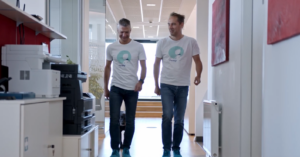Emotional Intelligence Coach: People Are Often Afraid Of Listening Closely Because They Fear Of Losing Sight Of Their Own Agenda

David Ryback, Ph.D. is an adviser to corporate presidents and introduces executives and managers to the advantages of using Emotional Intelligence to create better and more successful companies. He is the author of five books including the prominent titles “Putting Emotional Intelligence to Work” and “Successful Leadership is More Than IQ”. For Ryback EQ has been a topic ever since he was introduced to the psychologist Carl Rogers, one of the founding fathers of psychotherapy research and creator of the client-centered approach to psychology, which basically puts listening and understanding the other side in the middle of a healing process. This approach Ryback uses in his methods in business consulting and for resolving business conflicts. On a more personal level, Ryback is also deeply passionate about the topic as it helps him create a break in his shyness and stand in front of people giving lectures and trainings.
In fall, David Ryback visited Bulgaria and we used the opportunity to ask him about the role of emotional intelligence in business, especially in the dynamic tech sector, and about the ways to deal with different management and people’s issues.
Trending Topics: What are the pillars of emotional intelligence and what’s its role in today’s business environment?
Davin Ryback: The components are very basic. They are self-awareness, awareness of others or empathy, managing emotions, specifically negative ones like anxiety or anger and stress. The fourth component is using this information for successful outcomes or successful decisions. Often enough in the workplace, we tend to focus more on decision-making and dissemination of information and pay less attention to the need for recognizing individual differences and to connect one person to another in the larger scope of business. Anyone who’s dealing with people can benefit from emotional intelligence, especially leaders. And the higher in the hierarchy you are, the more important it is.
What is EQ in practice? It sounds like a very abstract concept.
Listening is a very abstract concept. The devil is in the details (smiles). We don’t really know how to listen deeply. What do I mean by listening deeply? Hearing the other person’s perspective independent of your agenda. People are often afraid of listening closely for fear of losing sight of their own agenda. Hearing the context of the other speaker’s world takes a skill that’s not abstract; it’s very concrete.
Can you learn this or are you just born with it?
Some people do have the natural ability to be nice to others. But most of us are not born with the ability to know the effect of your communication on others, to anticipate how what you’re saying is going to affect others. This is not something you are born with but can be learned.
Is there a way to train yourself to be more emotionally intelligent?
Well, first you have to understand the concept of emotional intelligence from some outside medium. You can do that by reading, Googling, watching TED talks, going to seminars. First, you commit to a source of information. Then, the next important decision is to commit to the practice of becoming familiar with it. Because unless you’re doing something over and over, your personality is not going to change.
The first thing to start with that is the easiest or least doable is not to focus on yourself but on other people and practice finding out how other people feel. It’s the easiest in the sense that you don’t need to worry about changing yourself apart from being open to learn more about others.
Part of your work is dedicated to consulting companies on the matter of EQ. Is there a clear correlation between business performance and emotional intelligence?
When L’Oreal provided emotional intelligence training to their salespeople, the company’s profits increased by $2.5m. Hay McBer also researched insurance salesmen and discovered that those with training sold policies twice the size of those who did not have training.
You can measure the time it takes to reach a decision. You can measure turnover rates – sometimes people who are not happy in a team would drop out you can give people a test and measure their satisfaction. Another measure is how people feel about one another.
Which are usually the issues companies come to you to ask for help?
If companies come to me with a particular problem, it usually has to do with personal differences. People in leadership positions often don’t like one another because they have different values. This dislike grows and grows until there is a real battle between them and they don’t communicate well, and their reports start forming teams against one another and you see whole departments in conflict. So, if they ask for help, it’s usually because of that.
Ideally, I sit down with each individual and get to the bottom of what the conflict is really about. I try to find a middle ground between what both groups want, some kind of compromise that they feel is fair, justified and could be done given the circumstances.
But you need to be aware, though such a process may take anything from one day to two years. Typically,it takes a couple of months.
Can you think of one particular challenge that you had to solve during your career and it was so hard that you still remember it?
We had this founder CEO who was very rational, decisive, no-feelings-involved kind of person. He was very focused and didn’t let any personal issues sidetrack him. Some people may consider such a person closed-minded because he’s so focused on the details of the job and less on the roles of others. This CEO had a conflict with a director who was more people-oriented and sensitive to people’s feelings. She was important; people liked her because she knew how to talk to people. And, at one point, he started telling her how to do her job in a result-focused way that was far from her people-oriented style. He was extremely stubborn and he thought people had to see things his way or get out. So, at one point, she had to quit and that was when I was invited.
I talked to the CEO and he told me that the director was crazy and untrustworthy. I talked to her after that and she told me that that CEO was crazy and untrustworthy. They both told me this, but they were not talking to each other. And so I realized that the only way to reach the CEO was to gain his trust, otherwise, he wouldn’t change. I noticed that If I would talk about how good she was, he could get defensive and not listen. So, I had to learn more about him and make him feel understood, the way he never felt understood before as people hadn’t had the opportunity to ask questions about his background and motivation for doing things. I spent the first few sessions with him just trying to get a sense of why he was the way he was. Only after I got his trust to some extent, he once asked: “What should I do?” and he had never asked that question before. Then, I knew that the next time I sit down with him, I could bring up the personality differences between them. I came back the next day in the afternoon and found out he had already taken her to lunch, which was surprising, and that he had reached an agreement with her that he would let her do her job without interference. Another tremendous change was that he started taking input from other directors as well.
I made the decision to make him feel understood so I could earn his trust and then he would listen to me without having to protect his ego. People are afraid that if they listen carefully, they would lose their power. But that’s a myth. The more secure you are, the more you give power to others and the more people would respect you.
Do you think EQ plays a different role in startups vs. corporations?
Generally, smaller groups are more efficient because they are more likely to know each other. They are usually friends who trust one another and often get together to form a company. They have a choice. In a big corporation, you don’t have that choice, at least not usually. So, there is a greater need for emotional intelligence training. They can overcome their barriers and get to trust one another. Trust is very important; it’s the oil that makes things work more smoothly.
Speaking of startups – these are companies often led by tech people who tend to think of themselves as highly rational and not emotional beings. What’s your take on this?
In some cases where they are high-tech and everything is working fine, then let success be success (smiles). But if there is some conflict, and often there is, then you need EQ. Satya Nadella even wrote a book in which he talks about the need for empathy and EQ in the high-tech world.
I think, only recently people started realizing that innovation requires partners– people with complementary skills and interests. Look at Steve Wozniak and Steve Jobs– one of them made the technology work and the other looked at the design and human-machine interface and how to make that attractive. Between the two of them you get a successful product.
People tend to find themselves in a natural way – Albert Einstein was not working alone but he had a woman engineer, Michele Besso, a friend of his, that he was able to share ideas with. He called her “the best sounding board in Europe.”
And still, any advice on what to do when faced with this type of rationality-defined people?
Well, there’s one interesting methodology called the DISC assessment, according to which there are four types of people. In any setting, you’d find at least one of them – Dominant, Influential, Steady, and Conscientious. The Ds focus on business applications, results, research – all they care about is bottom-line results. Then we have the Is – they like to be in meetings, make big decisions and be optimistic about the future. The Ss deal with emotions and authentic feelings. The Cs are the people who look at the details. They don’t care if they are not invited to the party, but rather stay at the desk and make sure everything is working. So, all these have different needs. And if you are not able to introduce any EQ practices and mindset directly, you might want to try a connection. In order to get to the – let’s call them “the high-tech bosses” for the purpose of this example – you need to go through one of his or her associates who is a doorway to him or her.
Now while we are on the tech-related ground, I’d love to have your perspective on one more thing. How do you think AI and recent developments such as AI-driven emotion-recognition software will impact the way we communicate with each other?
In my opinion, artificial intelligence creates an even greater demand for emotional intelligence. AI is quickly taking a central role in our lives and, if we miss the emotional part, we are going to pay the price down the road. If AI’s going to be successful, we’ve got to be looking at how people’s emotions are going to be respected, kept safe, and responded to. For example, if anyone is going to use AI to protect their home, their fears of being hacked and robbed need to be addressed. There are many ethical decisions we need to make in conceiving these technologies. And this is where the EQ of people is still needed. The more technology influences our culture, the greater the need for emotional intelligence.




























